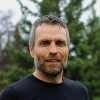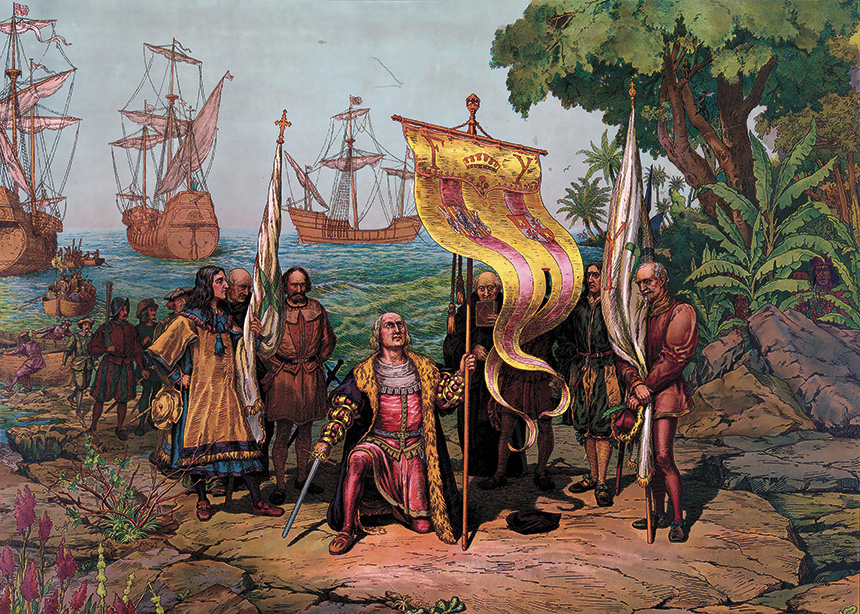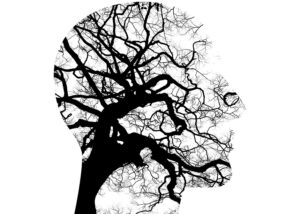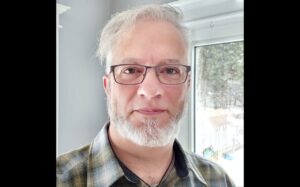After the Vatican’s recent repudiation of the Doctrine of Discovery, I spent two hours speaking with three Indigenous people about the 500-year-old church doctrine that is as much the bedrock of Canada as the Canadian Shield.
I asked about its relevance, the potential of its undoing, and a question I had never asked before. Those discussions left me feeling both low-level dread and an almost irresistible sense of the possibility of grace. First, what is the Doctrine of Discovery?
“The story of the Doctrine is the story of how you can obtain other people’s land by magic,” retired judge Harry LaForme told The Globe and Mail in 2022. “You just sprinkle these papal bulls and you get it.”
A few documents issued by popes—primarily “papal bulls” from 1452, 1455 and 1493—solidified the notion among European powers that if you land on a distant shore and plant a flag before your competitors, then it’s yours. The bull from 1452 granted “full and free permission to invade, search out, capture and subjugate the Saracens and pagans and any other unbelievers and enemies of Christ wherever they may be . . . and to reduce their persons into perpetual servitude.”
On what grounds would that pope have assumed the right to hand out such permission? It seems the height of presumption, but I confess that, as a schoolboy, the notion of planting a flag and claiming the land is one I never questioned.
Law of the land
In the 2022 Globe and Mail article, eminent Métis lawyer Bruce McIvor said European countries essentially agreed on colonial rules: “show up, usurp Indigenous sovereignty, assert sovereignty” and add it to your empire.
“The very legitimacy of Canada is based on this principle,” McIvor said. “Every time someone in Canada sells property and wrings their hands in glee over all the money they’ve made, they are participating in the Doctrine of Discovery. Every resource development, every pipeline—that’s all based on the Doctrine of Discovery.”
It’s more complicated, with contradictory legal declarations and caveats in different jurisdictions over the centuries, but one thing is clear: Europeans took over.
On the website of the legal firm McIvor heads, he explains that, “the often-used phrase ‘assertion of Crown sovereignty’ is a Canadian euphemism for the Doctrine of Discovery.” The phrase appears in recent Supreme Court decisions. The U.S. Supreme Court does not bother with euphemism; it has used “Doctrine of Discovery” as recently as 2005.
The Doctrine is the legal ground we walk on.
The Vatican stands down
Many people were baffled that Pope Francis offered no repudiation of the Doctrine during his trip to Canada last July. But on March 30, the Vatican issued a formal 800-word statement: “The Catholic Church . . . repudiates those concepts that fail to recognize the inherent human rights of Indigenous peoples, including what has become known as the legal and political ‘doctrine of discovery.’ ”
It also noted that, “Pope Francis has urged: ‘Never again can the Christian community allow itself to be infected by the idea that one culture is superior to others.’ ”
Ambassador Scott
Just a day before the statement came out, Dave Scott stopped by my southern Manitoba farmyard. He lives 85 kilometres to the west at Swan Lake First Nation. Among other topics, we chatted about the Doctrine, the missing church repudiation and the greater need for governments to walk back the Doctrine.
Scott has worked on various issues with First Nations from coast to coast. The Assembly of First Nations brings him to Ottawa somewhat regularly for consultations. Scott, whom I got to know a decade ago through my work with northern First Nations, is also an ambassador. He knows the neighbouring farmers, works with schools, speaks at church events, visits Hutterite colonies and is well known to municipal leaders who, I suspect, both like and fear him, depending on the circumstances.
After the repudiation, we spoke by phone. The Doctrine is a “mechanism of superiority,” he said. It says that one religion is “superior to all other belief systems.” In the ways he was taught, no belief system or group is superior.
Cree deacon
Harry Lafond also speaks plainly about superiority. Lafond served as chief of the Muskeg Lake Cree Nation north of Saskatoon for 10 years and as executive director of the Office of the Treaty Commissioner for 12 years. Currently, he is an Indigenous education scholar at St. Thomas More College in Saskatoon and a deacon in the Catholic Church. Lafond has interacted with Mennonites and participated in Mennonite events for many years.
He said the Doctrine, which “permeates everything of who we are as Canadians,” also “implies a superiority of race.” He’s talking church, governments and the public, both past and present. He talked about the assumptions that need to be dealt with in public engagement work—“one being that [non-Indigenous people] come from a better society.”
Another being around land. “It is unfinished business,” Lafond said of land questions.
Ownership
Non-Indigenous people tend to avoid or dance around the question of land ownership. Scott and Lafond talk about it freely, though both are uncomfortable with the concept of ownership per se.
“That’s not our way of understanding our place in the world,” said Scott, regarding the notion of land and everything on it being “subservient” to the owners. They use terms like access, responsibility and sharing.
The gist is unquestionable: “There’s no way to undo the Doctrine of Discovery without non-Indigenous Canadians giving up significant rights and benefits and land,” said Scott. Indigenous people need enough land to be viable and we all need lands to be managed to ensure current and future health.
Lafond and Scott are both concerned about agricultural practices that impact Indigenous lands and waters where they live. These include drainage and use of toxic farm inputs.
Both men walk a line between stating that far-reaching change is required and offering assurances that change can happen slowly and collaboratively.
It’s not about “giving back all the land or anything like that,” Scott said, “but we have to correct the relationship.” He’s firm and gracious: “[It] doesn’t have to be adversarial. . . . It’s not about overpowering one another, but recognizing that any laws that we create must be created together.”
Scott recognizes the “uneasiness” around this subject and acknowledges that dealing with land ownership is “a scary, scary thought.”
It will not be resolved quickly. “We have to think about it as a generational process,” said Lafond.
Last question
I left one question for the end of each interview. I was hesitant. I believe many non-Indigenous Canadians have a deep disquiet about the historical, legal and moral basis of our existence on this side of the Atlantic. On some level, people worry they are not welcome here.
The danger in asking about welcome is that it implicitly questions Indigenous hospitality, generosity and friendship, values Indigenous people have unquestionably demonstrated for 500 years. Still, I felt I needed to ask, wanting people to have a clear answer to any doubts they may harbour. I also want to address conversation-killing comments like: “We can’t just give all the land back,” or, “What are we supposed to do, go back to Europe?”
So, given that “decolonization,” in literal terms, would require non-Indigenous people to vacate the continent, is that the ultimate solution? (I did not ask it quite that directly.)
“Absolutely not. That goes against our belief system,” said Scott. “It’s not about getting rid of people, having our own world here. From our belief system it could never be like that.”
Lafond’s response is similar. “When I look back to the stories of my grandfather and great-grandfather, they were very, very open to having neighbours,” he said. “The issue is, if we’re going to be neighbours, we need to act like neighbours and feel that we can trust each other. . . . My understanding from the old people [is that we] should constantly be working toward harmony and peace amongst ourselves.”
The goal is for people to come closer, not the opposite. Scott often returns to the first law of his people, which he translates as “treat every person like a human being first.” Notably, during the times of early contact with settlers, including Mennonites, his people resisted calls from other Indigenous leaders to respond with violence.
Practical grace
Les Dysart, a friend from South Indian Lake in northern Manitoba, called on the same day I spoke with Scott and Lafond. Dysart is a fisher and a justice warrior for his people and lands. We talked about the Doctrine and the fundamental questions it raises.
“Nobody’s going anywhere,” he said. “We’re neighbours.” But the “one-sided outcomes” need to be balanced out. Scott says the world “has a huge debt to pay” to Indigenous people.
Dysart’s work involves addressing the disastrous impacts of hydro-electric projects. “I want to change [Manitoba] Hydro,” he said, but he’s clear that his goal is not to get rid of the company. Big change is needed, but he envisions a “positive future for both.”
I’m in no way off the hook, but I can proceed with my head held high and my heart invigorated by a friendship more powerful than fear.
Lafond, who has twice travelled to Rome to hear Pope Francis speak, said the Pope’s simple words about “walking with people” resonate with him. The Doctrine has never been about walking with people, he said. That needs to change.
“What does it mean for Mennonites in Canada to walk with Indigenous people?” he wondered.
Of course, the Doctrine is about more than what individuals do or what churches say. The essential legal regime of Canada needs to be revisited, starting with the Indian Act. But perhaps the groundwork on all levels involves examining assumptions. Do we assume adversarial postures? Do we assume superiority? Do we proceed with courage or hold to fear? Do we envision loss or friendship?
Lafond’s desire is to make his neighbours “aware that they can be part of the solution.” Can we see a rearrangement of the status quo as a solution? Can we see the letting go of our doctrinal benefits as the simultaneous discovery of mutual healing and liberation? The deeper the change, the deeper the realization of grace.
After speaking with Scott for most of an hour, he asked: “Have I scared you?”
“Absolutely,” I said. My wife and I own three hectares and stand to inherit much more. There’s no way that the sort of change he speaks of would not be scary, I told him, “but talking to you is not.”
For discussion
1. What does land ownership mean to you, whether or not you currently own land? What are your questions about the fundamental legality of how responsibility for lands and waters has been handled in Canada?
2. How is planting a flag on the moon the same or different from Europeans landing on a distant shore and claiming the territory?
3. What aspects of undoing the Doctrine of Discovery scare you? What aspects excite you?
4. Dave Scott and Harry Lafond say that the Doctrine of Discovery implies superiority of religion and race. What evidence of these attitudes exist in ourselves, our churches and our governments?
5. How can Mennonites in Canada proceed with courage in walking with Indigenous people?
—CM Staff












Leave a Reply
You must be logged in to post a comment.